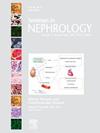通过患者报告结果,实现以人为本的老年肾病患者护理。
IF 3.5
3区 医学
Q2 UROLOGY & NEPHROLOGY
引用次数: 0
摘要
以人为本的护理是一种护理服务体系,它支持患者与医生之间的有效沟通,并赋予患者与临床医疗服务提供者合作制定目标一致的治疗计划的权力。以人为本的护理模式通常包括实施患者报告结果(PROs),以衡量患者在应对复杂的慢性疾病时的症状和生活质量。以人为本的护理模式在改善老年人以及患有衰老相关疾病(如身体机能下降)的年轻人的护理质量方面尤为有效。虽然 PROs 已在肾脏病领域得到开发和验证,但并未在临床实践中得到常规应用。大多数肾病患者年龄在 65 岁及以上,但许多年轻的肾病患者也会比普通人群更早出现衰老相关症状。因此,PROs 是实现以人为本的肾病患者护理的重要工具,这些患者最容易出现不良健康后果和过度使用医疗服务。在这篇文章中,我们的目标是将 PROs 更常规化地应用于老年肾脏护理中。为了确定与该群体临床最相关的 PROs,并了解实施 PROs 的理想模式和背景,我们将:(1)提供一份基于证据的 PROs 总结,这些 PROs 在普通人群和肾脏疾病中具有最大的预后意义,包括老年人特有的 PROs;(2) 描述在肾脏护理中实施 PROs 的障碍,特别关注老年人和患有衰老相关疾病的年轻成年人的需求;以及 (3) 最后,我们将就实施 PROs 的内容、时间和环境提出循证建议,以实现对老年人以人为本的肾脏护理。Semin Nephrol 36:x-xx © 20XX Elsevier Inc.保留所有权利。本文章由计算机程序翻译,如有差异,请以英文原文为准。



Patient-Reported Outcomes to Achieve Person-Centered Care for Aging People With Kidney Disease
Person-centered care is a system of care delivery that supports effective patient-clinician communication and empowers patients to partner with their clinical providers to develop goal-concordant treatment plans. Models of person-centered care often involve the implementation of patient-reported outcomes (PROs) to measure patients’ symptoms and quality of life as they navigate complex chronic health conditions. Models of person-centered care have been particularly effective in improving the quality of care delivery for older adults as well as younger adults with aging-associated conditions such as physical function decline. Though PROs have been developed and validated in kidney disease, they are not routinely implemented in clinical practice. Most individuals with kidney disease are 65 and older, but many younger individuals with kidney disease also experience aging-associated conditions earlier than in the general population. Thus, PROs represent an important tool for achieving person-centered care in groups with kidney disease who are the most vulnerable to adverse health outcomes and excess health care utilization. In this article, we aim to move toward more routine implementation of PROs in kidney care for aging adults. To identify the most clinically relevant PROs for this group and understand the ideal mode and context in which to implement PROs, we will (1) provide an evidence-based summary of PROs with the greatest prognostic significance in the general population and in kidney disease, including those specific to older adults; (2) describe barriers to the implementation of PROs in kidney care with a special focus on the needs of older adults and younger adults with aging-associated conditions; and (3) conclude with our evidence-based recommendations for the content, time, and context in which PROs should be implemented to achieve person-centered kidney care for aging adults.
求助全文
通过发布文献求助,成功后即可免费获取论文全文。
去求助
来源期刊

Seminars in nephrology
医学-泌尿学与肾脏学
CiteScore
5.60
自引率
0.00%
发文量
27
审稿时长
6-12 weeks
期刊介绍:
Seminars in Nephrology is a timely source for the publication of new concepts and research findings relevant to the clinical practice of nephrology. Each issue is an organized compendium of practical information that serves as a lasting reference for nephrologists, internists and physicians in training.
 求助内容:
求助内容: 应助结果提醒方式:
应助结果提醒方式:


